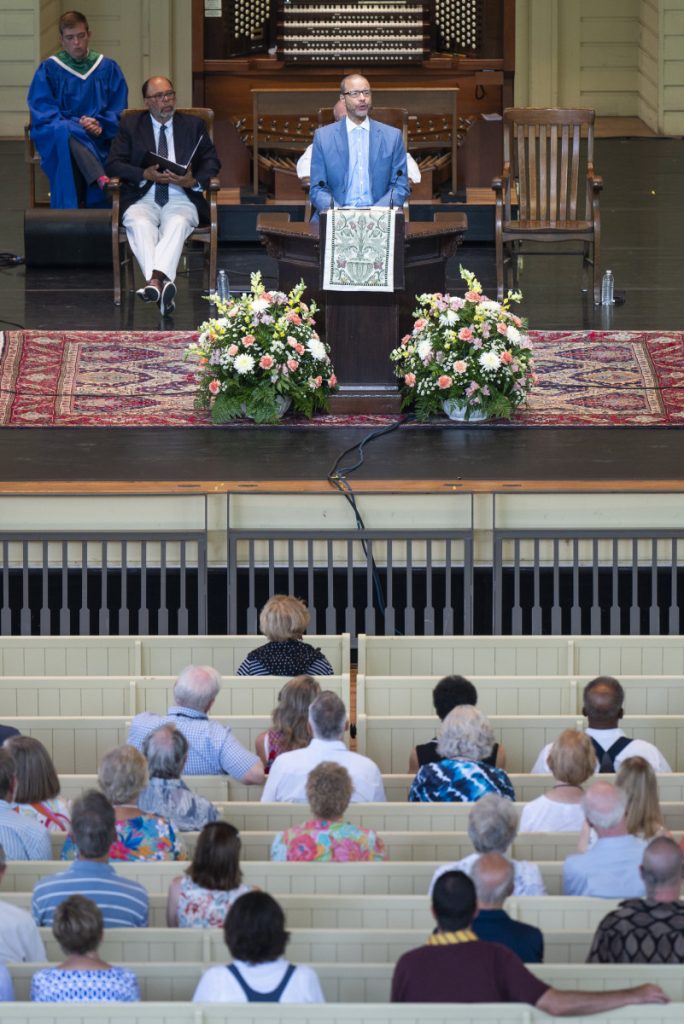MARY LEE TALBOT – STAFF WRITER

“On Sunday I gave you the word hesed, steadfast love; today I give you epiousios, daily,” the Rev. Frank A. Thomas said. Hesed is used at least 240 times in the Hebrew Scriptures; epiousios is used twice in the Christian Scriptures.
Thomas preached at the 9 a.m. Monday, July 26 morning worship service in the Amphitheater. His sermon title was “Our Daily Bread.” The Scripture text was Matthew 6:11.
After a devastating flood, Thomas and members of his church ministry team went to work serving on a soup line to help those who had lost everything. “A woman came through, and as I plopped the potatoes on her tray, she broke down and cried. She said, ‘I am a CPA, and I never dreamed I would be in a soup line.’ ”
Thomas continued, “All things come of thee, O Lord. The request, ‘give us this day our daily bread,’ is addressed to the giver, God, who supplies all the resources, the water, the sunshine, the rain, the air, all that provides life. Our ability to work and earn our food comes from God.”
God supplies our daily bread, Thomas told the congregation. “It is not your training or your intellect. God provides the context for us to earn a living and to eat. The fact is, God supplies our daily bread.”
He told the congregation that we can’t force God to give us bread — we have to ask. “You don’t say, ‘I am going to take; I am entitled to; I demand; You owe me; You have to give it to me.’ This is a prayer of beseeching. ‘Please give me bread because if you don’t, God, I won’t have any.’ We are asking God to be merciful and compassionate.”
The word “daily” describes the precariousness of life in the first century. “People were paid at the end of each day. Illness would harm the whole family. Daily bread was precious, urgent and needful to feed the family. It was a hand-to-mouth existence and payment was needed at the end of each day, epiousios.”
Epiousios is only used in the two versions of the Lord’s Prayer in Matthew 6:11 and Luke 11:13. “When we interpret Scripture, we look at all the contexts the word is used in,” Thomas said. “There is a struggle to translate it. The Coptic version is ‘give us bread for tomorrow.’ The Latin Vulgate is the first translation to use ‘daily.’ ”
Another understanding of epiousios is “sufficient for the day.” In Exodus 16:15, God sent manna to the Israelites, enough to be sufficient for the day. There was no way to store it or hoard it.
“The word ‘daily’ stands against the temptation of insurance. It stands against financial plans, 401(k)s, 403(b)s, wills to pass along an inheritance,” Thomas said. “ ‘Daily’ is a corrective and a warning. When we have too much insurance, we begin to believe that we are self-sufficient; we imagine we are independent of God.”
He continued: “ ‘Daily’ makes us conscious of the hand-to-mouth existence and we need to trust more in the good and perfect gift of God and not our connections or our money.”
Bread is still the major food source for the majority of the world. Thomas said, “We have enough bread — what we have is a distribution problem. We store bread in barns, and charge for it, and tell people, ‘If you can’t pay, you can’t eat.’ The United States has plenty of bread. Why do we have so much and others so little?”
The petition in the Lord’s Prayer applies to rich, poor, white, Black, Americans and the rest of the world.
“Give us — from the poorest person on earth to the wealthiest, who just took a jet into space — what is sufficient for the day, the spiritual and physical bread we all need,” Thomas said.
God is in a revolutionary position; God offers bread free of charge. God, through the prophet Isaiah, called people to an abundant life: “Everyone who thirsts, come to the waters; and you that have no money, come, buy and eat!”
Thomas said, “God does not have a distribution problem. Our response as God’s people is to say, ‘Come, buy and eat.’ This is the promise of God, God’s agenda and God’s table: You will get what is needful, you will have bread for this day.”
He continued, “Jesus is the bread of life. If you have no money, no status, no class, you can ‘come, buy and eat.’ ”
Thomas urged the congregation, as they walked around Chautauqua, to ask God for daily bread, and ask God for spiritual food for the day. “Give me what I need for today, and let me not forget that all things come from God.”
The Rt. Rev. V. Gene Robinson, vice president of religion and senior pastor of Chautauqua Institution, presided. The Rev. Paul Womack, interim pastor of Hurlbut Memorial Community Methodist Church, read the Scripture. Joshua Stafford, who holds the Jared Jacobsen Chair for the Organist and is director of sacred music, played “Adagio,” from Sonata No. 1, by Felix Mendelssohn. Members of the Motet Choir sang “Look at the World,”’ music and words by John Rutter. The postlude was “Now Thank We All Our God,” by Sigfrid Karg-Elert. The Geraldine M. and Frank E. McElree Jr. Chaplaincy Fund and the John William Tyrrell Endowment for Religion provide support for this week’s services and chaplain.




